Ein Meisterkurs für Advanced Grammar in Use: Phrasal Verbs
A Masterclass in Advanced Grammar in Use: Phrasal Verbs
┃Read in less than 9 minutes
Sign up here to receive the Advanced Grammar in Use: Phrasal Verbs exercise by email:
The Big 5
To start, let’s talk about these 5 most common ‘base’ verbs that are used for making phrasal verbs. These figures are according to the number of unique entries in the Cambridge Phrasal Verb Dictionary (CPVD). It’s important to note that certain phrasal verbs can have multiple meanings. For example, ‘break down’ and ‘break something down’ have eight different meanings! For the purpose of this blog, however, it just counts as one.
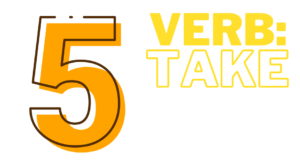
There are 25 entries for ‘take’ in the CPVD.
Example: I’m thinking of taking ____ surfing.
Can you think of a phrasal verb that means ‘to start a new activity, sport or hobby’? That’s right it’s to ‘take up’.
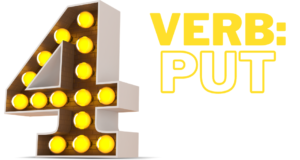
‘Put’ has slightly more with 30 entries.
Example: I’ll wash and dry the dishes if you put them ____.
What particle do you think could complete the sentence? Yup, it’s ‘put away’, which means to put things back in the right place.
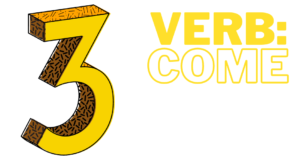
There is a jump up to the next one, ‘come’, which has 42 entries.
Example: Ed came ___ these photos while tidying the attic.
Do you know the phrasal verb we use for saying that something is found by accident? It’s ‘come across’.

‘Get’ is just ahead with a total of 45 entries (although the number of total meanings would be astronomically higher!)
Example: It can be hard to get ___ in a foreign country.
In this context, we need a phrasal verb which means to move or travel to different places. Any idea? Great job, yes, it’s to ‘get around’.

‘Go’ has a whopping 53 entries in the CPVD. That’s a huge number! Unsurprising then that it’s one of the busiest, most used verbs in English.
Example: Go___ your phrasal verb lists before the exam.
What is a phrasal synonym for ‘review’ or ‘revise’? It’s ‘go over’, which means to look at it carefully again.
Task 1
Complete the sentences using the correct form of the verb(s). Pay attention to the particles in bold. (You will find the answers in the handout)
- Drink this. It could help you to ____ over your cold.
- How did you manage to ____ by this job?
- We’re planning to ____ up a new fence around our garden.
- I might ____ these shoes back and get a bigger size.
- I think you should give Ali a call. He’s been ____ through a hard time recently.
Let’s continue with the topic of particles …
Be particular about particles
Phrasal verbs are made up of a verb and a particle (e.g. an adverb or a preposition) and they can sometimes have multiple meanings. Using the wrong particle can cause serious misunderstanding so it’s important you watch out for these and try to get them right!
Let’s take a look at some examples:
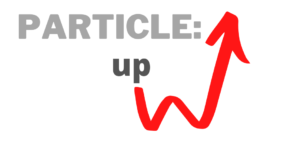
Example: Argh! I see all the toilet paper has been bought up again.
Definition: One meaning of « up » is to finish or complete something. For example, ‘add up’ is to add numbers together until you get to a final sum. ‘Clean up’ is to clean a house until it is extremely clean. In this case, ‘buy up’ means to buy all of something (or at least as much as you can get!)
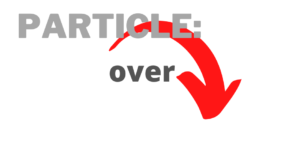
Example: The milk is boiling over! Quickly take it off the heat.
Definition: If a liquid boils over then it flows over the sides of the pot. A difficult situation or a negative emotion can also boil over when it can’t be controlled. As a result, people will start to argue and fight.

Example: Their video game start-up is really starting to take off!
Definition: ‘Take off’ is when a plane leaves the runway and starts to fly. It can also mean to remove an item of clothing. In this context, however, it means to suddenly become really successful or popular, like a company, a product or someone’s career.
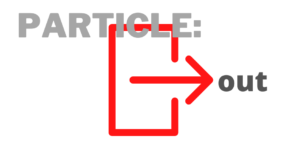
Example: Luis, have you managed to work out the costs of the car loan yet?
Definition: You probably know that ‘work out’ means to exercise. We can also use it to describe a bad situation that becomes better, like if your friend is worried about something, you could comfort them by saying it’ll all work out for the best. In the example, it means to calculate something like a price or rate.
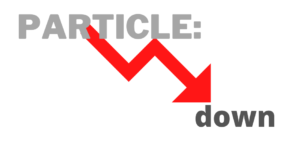
Example: Mariola has just come down with a heavy cold.
Definition: ‘Come down’ means to fall to the ground (like leaves from a tree). It also means to lower the level of something (like price of houses). When you add the particle ‘with’ it gives the phrasal a third meaning, namely to start to suffer from a (minor) illness like a cold or the flu.
Task 2
Take a look at these phrasal verbs:
- go over
- ask out
- switch off
- cut down
- break up
Which ones of these do you recognise?
So, if you want to know if a sentence can be turned into the passive, always look for the object of the verb first!
Use Phrasal Verbs from the list to transform the sentences to make them less formal.
- I think that Gina and Mike have ended their relationship for good.
- If you like her, you should invite her to go out with you.
- You really ought to think about reducing the sugar in your diet.
- Sorry, can you repeat that? I stopped concentrating for a moment.
- If I were you, I’d spend five minutes a day revising phrasal verbs.
Task 3
And finally, let’s do a Use of English Part 4 task to put all of this theory into exam-style practice.
For questions 1-6, complete the second sentence so that it has a similar meaning to the first sentence, using the word given. Do not change the word given. You must use between three and six words, including the word given.
NOTE: All the phrasal verbs in the answers have one particle in common. Can you figure out which one it is?
1. The new car is just as good as Matt had expected.
LIVED
The new car __________________ expectations.
2. Carl really ought to admit to his mistake.
OWN
I wish Carl __________________ his mistake.
3. Everyone expects a huge crowd to attend the festival.
TURN
A huge crowed is __________________ the festival.
4. I’m pleased that you suggested coming to the beach.
CAME
I’m pleased that you __________________ coming to the beach.
5. Kate doesn’t intend to stop trying for a career in law.
NO
Kate has __________________ trying for a career in law.
6. The lorry started to go faster as it rolled down the mountain.
PICK
The lorry started to__________________ as it rolled down the mountain.

And now, it’s over to you.
The verb ‘turn’ is another common base verb for phrasal verbs (with 17 in the CPVD). How many examples can you think of? Write your ideas, along with examples sentences, in the comment section. We’ll give feedback to the first and/or most interesting comments 🙂
And remember, when it comes to Phrasal Verbs, this is the tip of the iceberg.
If you want to learn about the difference between separable and inseparable ones, or find out more about Phrasal Verbs with two particles, then check out Part 2 of this blog. And, of course, you can always contact homestudies for more tailor-made tutoring. That’s what we do 😉






0 commentaires